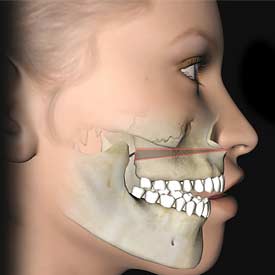Corrective Jaw Surgery
Corrective jaw surgery (also known as orthognathic surgery) is used to correct upper and lower jaw imbalance and abnormalities, especially those that cannot be fixed with braces alone. In some cases, the patient’s teeth do not fit together properly (malocclusion), the airway is obstructed during sleep (obstructed sleep apnea) and/or the balance and appearance of the face needs improvement. Some of these issues may be caused by craniofacial conditions, such as cleft lip, cleft palate and syndromic craniosynostosis.
What to expect
Before surgery, our orthodontist will use a CAT scan and 3D virtual simulation surgery to create cutting-edge, patient-specific splints and models. This helps the surgeon determine how to align the teeth in a certain way in order to get the appropriate configuration, within 1 millimeter of accuracy. The patient may also have to wear braces for a year or more to help properly align the teeth in the upper and lower jaw.
During surgery, the doctor will break the bone and move it into the appropriate position, which may require moving the upper jaw, the lower jaw or both.
In addition to jaw surgery (or in place of it), we can perform a genioplasty, where we reshape, advance or shorten the chin to complete your facial profile.
Complications
- Need for additional/repeat procedures
- Temporal mandibular joint (TMJ) issues
- Velopharyngeal insufficiency (VPI), or unintelligible speech due to air escaping out of the nose (due to the stretching of the palate)
Recovery
Most patients spend one to two nights in the hospital after jaw surgery. (Patients undergoing just a genioplasty often return home the day of their operation.) You may experience swelling and will be given pain medications to take home.
Elastic rubber bands are usually placed on your braces to guide you into your new bite. Be sure to keep your teeth and mouth clean. You may need to be on a soft or pureed food diet for four to six weeks after the operation.
Medications
You may be given several types of prescriptions following jaw surgery.
- Pain Medication: should be taken only during the time that you feel significant discomfort. If the pain is severe, the prescription pain medication may be used. However, if pressure or mild discomfort is experienced, attempt using less potent over the counter medications such as Paracetemol, Nurofen, etc. Try and time your pain relief to be taken at night so that you get a good night sleep.
- Antibiotics: You may be given a prescription for an antibiotic such as Augmentin, etc. These should be taken at the appropriate interval as described on discharge. Be sure not to miss any doses until the medication is gone. Note: Some types of antibiotics can reduce the effectiveness of birth control pills. Please contact your gynaecologist if you have any concerns.
- Decongestants: Following orthognathic surgery, especially upper jaw surgery, there can be considerable stuffiness of the nose and sinuses. A decongestant such as Otrivine Nasal Drops, etc. can be indicated for 7-10 days following surgery if necessary.
- Nasal Spray: can be used at 4-6 hour intervals to help improve breathing through your nose. In order to prevent overuse of nasal spray, this can be alternated with plain saline nasal spray or mist. These can be purchased from your pharmacy. If you have had upper jaw surgery, do not blow your nose for at least 14 days following surgery.
- Lip Ointment: Use Vaseline for the first 10 days after surgery. Keep enough ointment on lips to keep them appearing moist.
